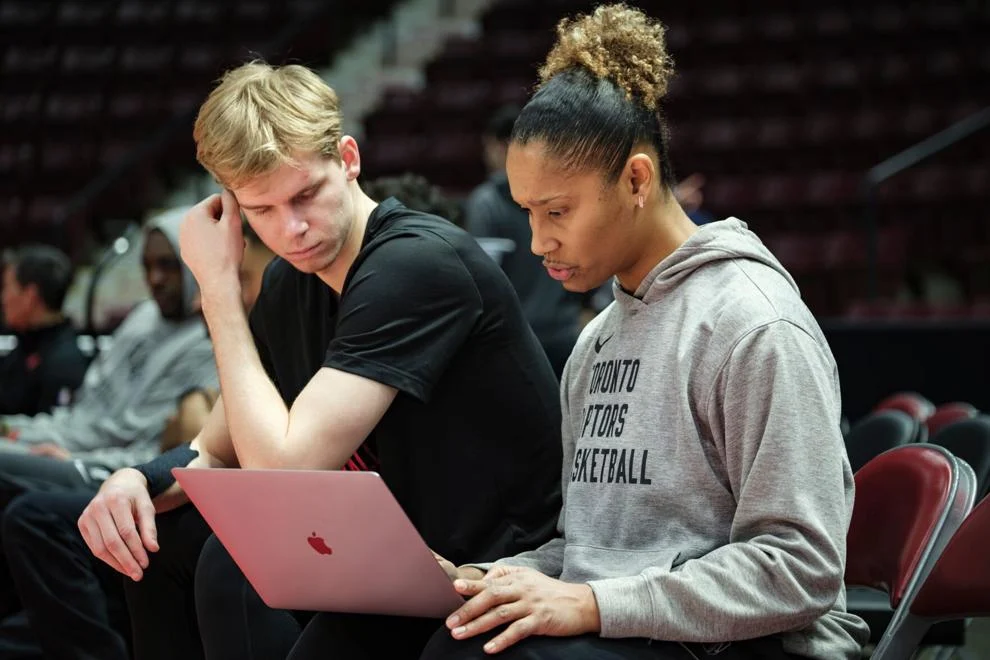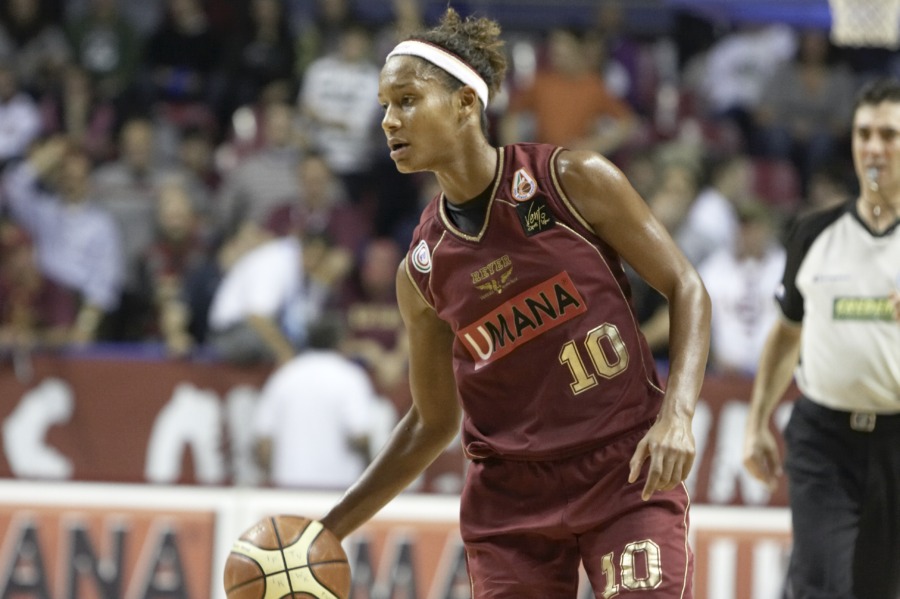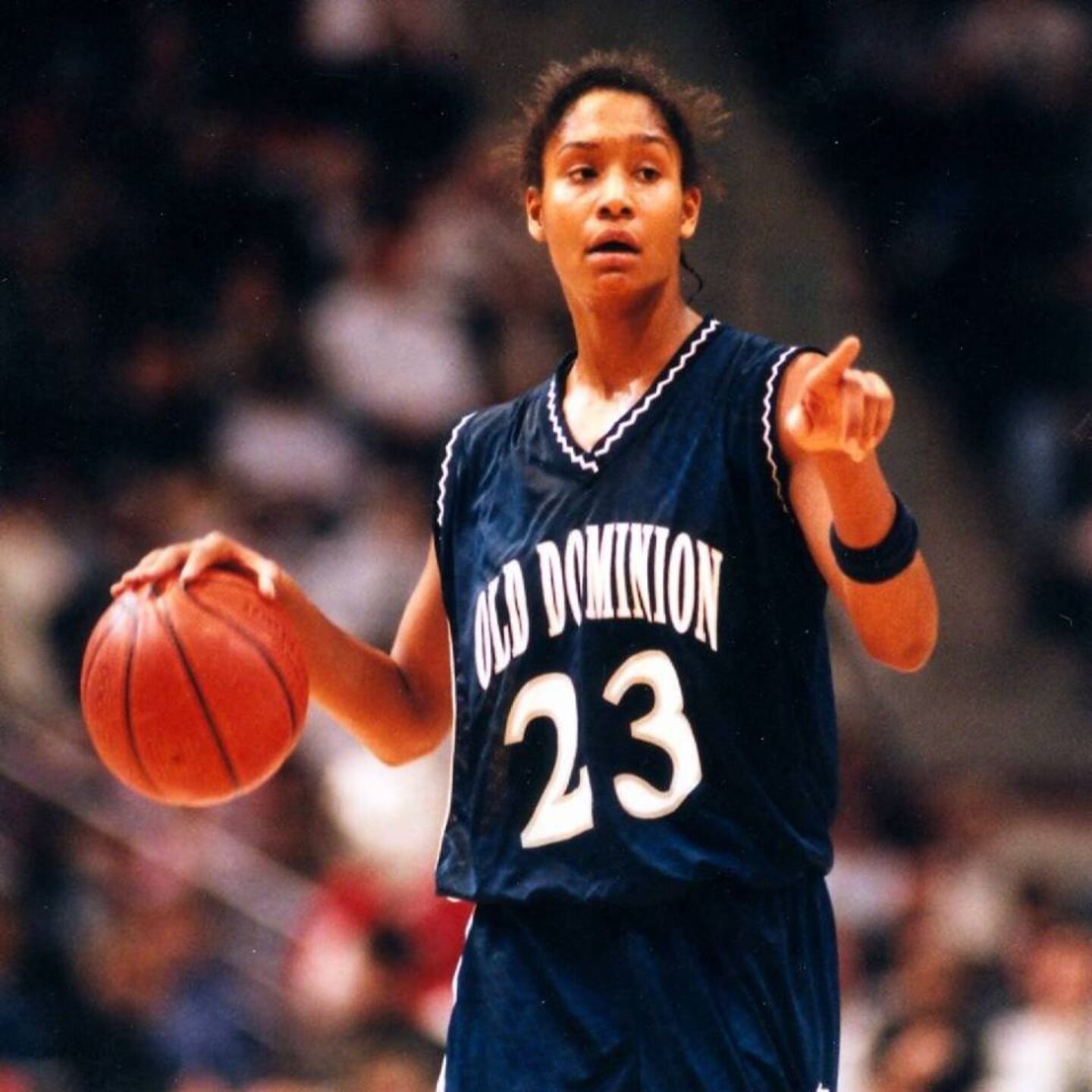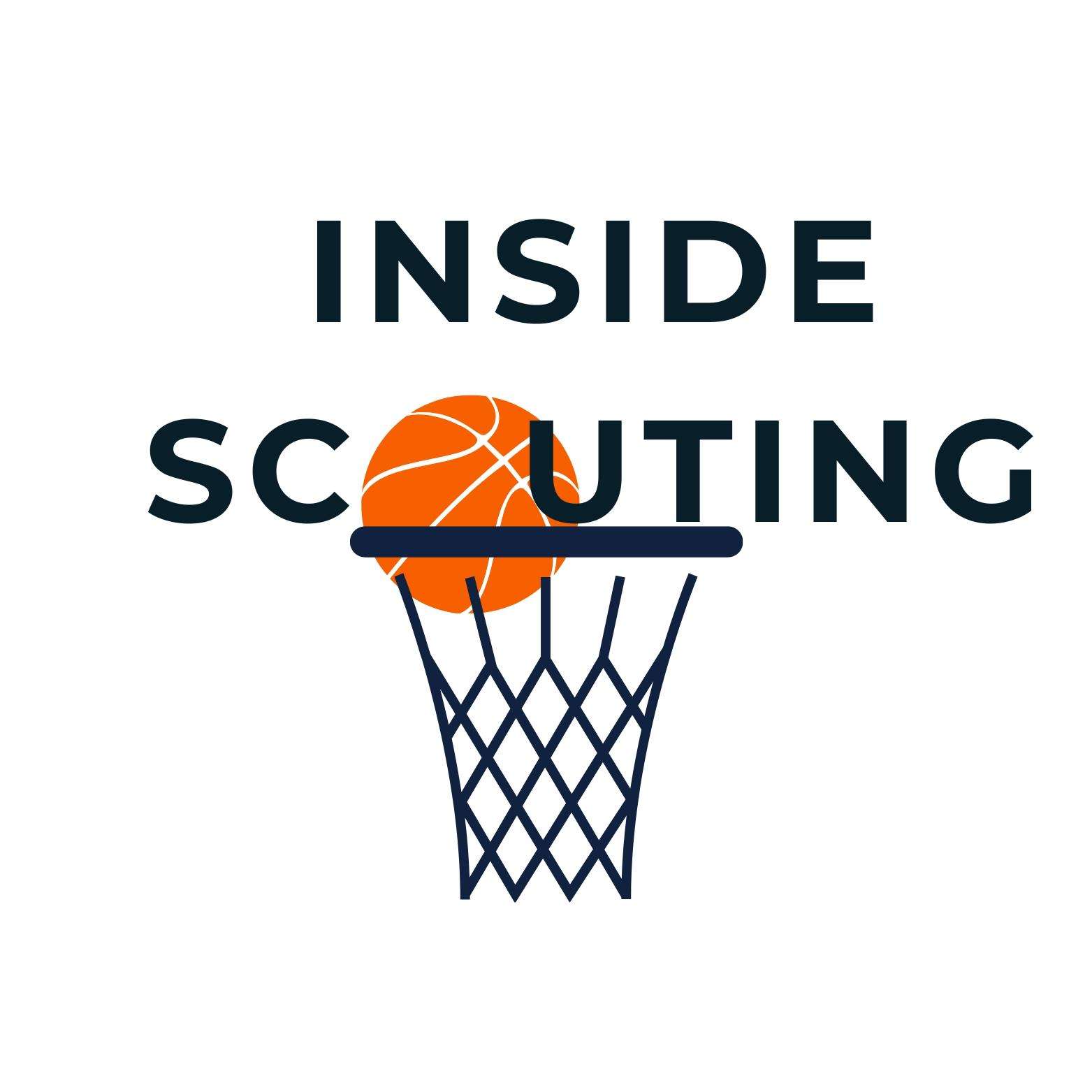INTERVIEWING:
MERY ANDRADE
- Orazio Cauchi
- Interviews
- 16 July 2024
For every scout out there, this is a very busy period. The NBA Summer League is one of the crucial moments of the offseason. So many executives, scouts, and agents are all in the same place, doing their work, analyzing the most recent draft picks, and watching those players who are still free agents and look for an opportunity to impress.
For our second episode of Inside Scouting, we thought that it would have been great to have someone on board who could have explained the feeling of the NBA Summer League and how this period of the year represents a huge opportunity, not only for the players but also for coaches.
We’re proud to present you our interview with Mery Andrade, one of the few female assistant coaches in the NBA, who’s working for the Toronto Raptors and from Las Vegas she shared with us her Summer League experience, his path as a coach, and much more

 Q: “You are one of the few women on a coaching staff in the NBA, in an environment
normally dominated by men. From your perspective, where does the league stand in terms
of opportunities for women? Do you think the situation has improved from the past? Do you
think it’s only a matter of time before we get to a situation where a woman can become head
coach of an NBA franchise?”
Mery Andrade: : “As in all things I think it’s just a matter of time. One of the main
characteristics of us women, one of our best qualities is our persistence in achieving what
we want. We have to be patient and keep showing the good work we can do. Only through
work can we achieve something that, in fact, would be rightfully ours. Because so many
times I hear the criticism, “You only got this job because you’re a woman,” and of course, it’s
a criticism that comes from a man in most cases. I, in some ways, can even come to
understand such a criticism but I could easily counter it by saying that for years and years,
many men got their jobs just because they were men and not because they were the best at
their jobs. Now the doors for women are opening a little bit more but if they had opened
earlier, there would have been a lot more women in this job, because there are a lot of
extremely capable ones who for so many years simply did not have a chance in this world. I
have been preparing for years and continuing to try to improve myself as a coach even if
such an opportunity might arise because the only way for us is just to be super prepared so
that we do an excellent job when the opportunity comes”.
Q: “As a former WNBA player, how do you evaluate the evolution of the league in recent
years? There’s definitely been more attention and more coverage from the media, but
financially speaking it doesn’t look like the players are at a level that can be considered
satisfying. Most of the WNBA players still go to play overseas, once the WNBA season is
over, to make more money. What do you think it can be done to improve the situation?”
Mery Andrade: : “The league has grown from the time I was playing. In my time in the WNBA,
you often got paid exclusively in bonuses based on goals accomplished, there wasn’t even a
real salary, so you were basically forced to go play in Europe once the WNBA season was
over. The last CBA definitely improved the situation, especially in terms of rights for the
players. The next big battle for the next CBA will be to get a greater percentage of the
revenue that comes in from TV rights and merchandising sales. In the NBA, in fact, the
division of those revenues now is in favor of the players, who get 51 percent compared to 49
percent for the owners, while in the WNBA the situation is still clearly in favor of the owners,
who keep 70 percent of the revenue, leaving only 30 percent for the players. As you were
saying, now there is more attention from the media but also from the fans, so many games
are sold out, but players’ salaries are still at a low level, so this needs to be changed. This is
not just an economic issue. If female players started earning more in the WNBA, they could
also play more, because they wouldn’t have to play all year to earn money abroad. So it’s
also about protecting the players’ health. Even I, during my career, at one point, chose to
play only in Italy, because if I had continued to play in both the WNBA and Europe, my knee
would not have held up and my career would have been shorter”.
Q: “You are one of the few women on a coaching staff in the NBA, in an environment
normally dominated by men. From your perspective, where does the league stand in terms
of opportunities for women? Do you think the situation has improved from the past? Do you
think it’s only a matter of time before we get to a situation where a woman can become head
coach of an NBA franchise?”
Mery Andrade: : “As in all things I think it’s just a matter of time. One of the main
characteristics of us women, one of our best qualities is our persistence in achieving what
we want. We have to be patient and keep showing the good work we can do. Only through
work can we achieve something that, in fact, would be rightfully ours. Because so many
times I hear the criticism, “You only got this job because you’re a woman,” and of course, it’s
a criticism that comes from a man in most cases. I, in some ways, can even come to
understand such a criticism but I could easily counter it by saying that for years and years,
many men got their jobs just because they were men and not because they were the best at
their jobs. Now the doors for women are opening a little bit more but if they had opened
earlier, there would have been a lot more women in this job, because there are a lot of
extremely capable ones who for so many years simply did not have a chance in this world. I
have been preparing for years and continuing to try to improve myself as a coach even if
such an opportunity might arise because the only way for us is just to be super prepared so
that we do an excellent job when the opportunity comes”.
Q: “As a former WNBA player, how do you evaluate the evolution of the league in recent
years? There’s definitely been more attention and more coverage from the media, but
financially speaking it doesn’t look like the players are at a level that can be considered
satisfying. Most of the WNBA players still go to play overseas, once the WNBA season is
over, to make more money. What do you think it can be done to improve the situation?”
Mery Andrade: : “The league has grown from the time I was playing. In my time in the WNBA,
you often got paid exclusively in bonuses based on goals accomplished, there wasn’t even a
real salary, so you were basically forced to go play in Europe once the WNBA season was
over. The last CBA definitely improved the situation, especially in terms of rights for the
players. The next big battle for the next CBA will be to get a greater percentage of the
revenue that comes in from TV rights and merchandising sales. In the NBA, in fact, the
division of those revenues now is in favor of the players, who get 51 percent compared to 49
percent for the owners, while in the WNBA the situation is still clearly in favor of the owners,
who keep 70 percent of the revenue, leaving only 30 percent for the players. As you were
saying, now there is more attention from the media but also from the fans, so many games
are sold out, but players’ salaries are still at a low level, so this needs to be changed. This is
not just an economic issue. If female players started earning more in the WNBA, they could
also play more, because they wouldn’t have to play all year to earn money abroad. So it’s
also about protecting the players’ health. Even I, during my career, at one point, chose to
play only in Italy, because if I had continued to play in both the WNBA and Europe, my knee
would not have held up and my career would have been shorter”. 
Q: “You have spent many years playing in Europe, especially in Italy. What kind of suggestion would you give to someone who’s about to have his first experience playing overseas? What kind of mental approach do they need to have to get the best possible experience playing overseas?” Mery Andrade:: “All players, male and female, have a dream: to play in the NBA or WNBA. But each of us has a different path to get to our dreams. If someone doesn’t make it to the NBA or WNBA on their first try, they shouldn’t see Europe as a failure or a punishment, it’s all part of a path that you have to keep following to get to the dream. It all depends on the situation, I believe that in several cases going to play in a EuroLeague team is better than playing in the G League, because you play with very experienced players and because you get to enrich your playing style, as the NBA is taking more and more tactical elements from Europe. Another aspect to consider is that there are so many scouts in Europe, so there is not even the worry of not being seen by NBA teams, there are many more NBA scouts in Europe than in the United States. There are now a lot of players who go to Europe, hone their game there for a few seasons, and then come to the NBA, without needing to go through the G League. Basketball is changing, and that’s what the players need to understand, and their agents need to be able to make their clients understand it as well. The style of play is changing, and what teams are looking for in players is changing, it is not like in the past when there was always a distrust of Europe and players coming from the old continent. It is changing the style of play, it is changing the characteristics that teams are looking for in players, it is not like in the past when there was always a distrust of Europe and players coming from the old continent. If we look at the last NBA MVPs, they have always been European players in recent years”.
Q: : “Do you have a specific goal for your future? What’s the next step in your career that you want to reach? Mery Andrade: : “I definitely want to coach at the highest level possible, and I want to continue to improve and learn. Now in the NBA I am in the second row of the bench, one of my goals is definitely to get to the front row. Another one of my big goals is to coach a national team. I will continue to work and put myself in a position to be prepared if such opportunities come. I remain confident that the work I have done so far will help me make sure that these opportunities will come”.
Q: “Basketball in Portugal has never been the most well-known or most popular sport, but from your perspective do you believe there’s been progress in the Portuguese basketball movement in recent years? And where do you believe there’s still room to improve?” Mery Andrade: : “I think there has been growth in recent years. Although I spend a lot of time in Italy when I’m not in the United States, I still stay in touch with coaches, agents, and players in Portugal, I also do clinics. From what I can see the federation seems more involved in the process of growing the movement, something that was not very present when I was playing. They do a lot of events for younger people, as early as minibasket to instill the culture of basketball in children as well. Last year I had the opportunity to be present at the basketball festival that took place in Albufeira, a beautiful event with a lot of young people present. The key is really to be able to attract as many young people as possible, so from that point of view I am optimistic. Of course, there is still a lot of work to be done to increase the level, most importantly we have to be able to offer a league that is more attractive to players, leading them to stay more in the country, because so many go to play in Spain or France or go to college in the United States. If we can have a more competitive league, it will also be easier to retain the best domestic players”.
